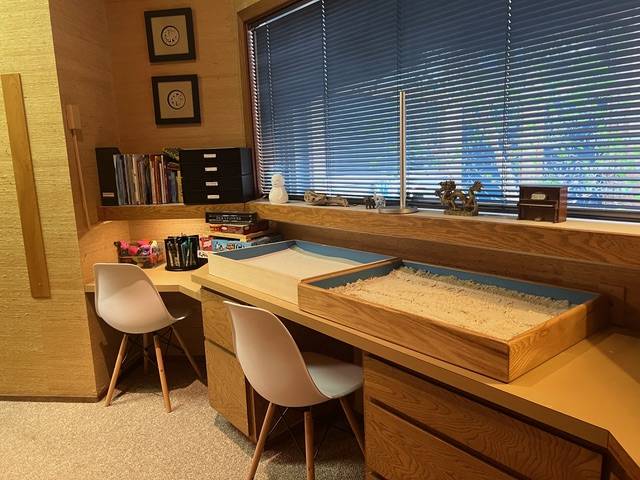Child Therapist in Marin
What does a child therapist do?
Children communicate differently from adults. Adults tend to communicate verbally, but children communicate through play. They often lack full awareness of their experiences and struggle to articulate their feelings or express their needs, even if they are highly verbal.
As a child therapist, I create a safe place for kids to open up, feel at ease, and share what’s on their mind.
Play therapy is a specialized approach for children under 12 that uses play as a natural way for them to express themselves, explore emotions, and solve problems. Because young children often communicate better through play than words, this therapy helps them process challenges symbolically. Through sandplay, dream work, and using tools like games, toys, art materials, and dolls, I create a safe space for children to open up, build skills, and work through their thoughts and feelings. Play fosters creativity, imagination, and cognitive development, with research showing its positive impact on intellectual growth. Through this process, children gain self-understanding and begin to feel better.
By expressing their thoughts and feelings freely and safely, verbally or through play, kids begin to understand themselves and start to feel better.
“It’s difficult to pinpoint, but something isn’t working.”
Common Issues Discussed
Every child is unique. Some common topics and issues that come up in session are:
- Anxiety, overthinking, or excessive worry
- Grief and loss
- Avoidance
- Perfectionism
- Procrastination
- Friendship drama
- Heartbreak
- Communication
- Self esteem
- Independence
- Applying for or starting high school or college
- Irritability or anger
- Moodiness, meltdowns, & blowups
- Body changes & body image
- Leaving for college & other separations or losses
I do not work with families experiencing significant marital conflict, going through divorce or separation, dealing with parental substance abuse, under a court-ordered treatment mandate, or where a child or parent is currently engaging in self-harm or dangerous behaviors.

What is Sandplay Therapy?
Healing begins when we feel safe enough to express what words cannot capture. Sandplay therapy is a powerful, nonverbal approach that allows individuals to explore their inner world through symbolic play. Using a tray of sand, miniature figures, and a therapist’s guidance, clients create scenes that reflect unconscious thoughts, emotions, and conflicts.
This method, rooted in Jungian psychology, provides a pathway to self-discovery, healing, and transformation. Whether processing trauma, grief, anxiety, or personal growth, sandplay helps individuals—both children and adults—access deep emotions and integrate them in a meaningful way.

How It Works
What To Expect Seeing A Child Therapist
The consultation process typically consists of six sessions:
Parent Sessions: The first session is a 90-minute consultation with both parents, ideally in person. Telehealth is available for convenience.
Child/Teen Sessions: The next four sessions are individual meetings with the child or teen.
Parent Follow-Ups: Additional sessions may be scheduled as needed to gather family history and background.
Feedback: The final session provides feedback and recommendations.
After the consultation process:
Kids and teens attend weekly 45-minute sessions (or more frequently if needed).
Parents attend monthly or bi-monthly 45-minute collateral sessions.
Kids Express Themselves Differently Than Adults
I have extensive training and experience as a child therapist and have worked with many kids and teens who are bright, high achieving, worrying, grieving, have self doubt or lowered confidence. Using a depth oriented, psychoanalytically-informed, relational, attachment, neuroscience and mindfulness approach, I help kids reach their true poential.
Frequently Asked Questions
What are your hours?
Mon. 11:00 A.M. – 5:00 P.M.
Wed. 9:00 A.M. – 6:00 P.M.
Thurs. 9:00 A.M. – 5:00 P.M.
How long are your sessions?
The initial consultation/evaluation is 90 minutes. Therapy sessions are 45 minutes and scheduled at a weekly frequency. Parent collaterals are 45 minutes and scheduled at a monthly frequency or more depending on your needs. Consultation sessions with clinicians are also 45 minutes and are scheduled as frequently as appropriate to suit your needs. Depending on your situation or at various times during your treatment, we may determine to increase that frequency to twice a week or more.
What are your fees, cancellation, and rescheduling policy?
As a licensed psychologist, my fee for an initial evaluation/consultation is $500 for 90 mintues. You may also schedule a free 20-minute consultation using the contact form at the bottom of this page.
Ongoing psychotherapy, play therapy, parenting therapy, and consultation is $250 for 45-minutes.
I require a 7-day notice for cancelling or rescheduling appointmets.
Please Note: Under the No Surprises Act, you have the right to receive a Good Faith Estimate for the total expected cost of any non-emergency healthcare services, including psychotherapy services.
Do you accept insurance?
No. But after working with many insurance companies for nearly 20 years, I understand how complex navigating insurance can be. It’s important for you to understand your benefits. I work with patients who want to use their Health Savings Account (HSA) or their out-of-network benefits. Through my secure patient portal, you will have access to all your invoices at any time. Each invoice includes all the information you need to submit any out of network claims. My patients have told me that this access was easy, convenient, and much appreciated.
What types of payment do you accept?
I accept cash, checks, credit cards, and HSA credit cards.
What do I do if I have an emergency?
Call 911 to go to your nearest emergency room.
If you live in Marin county, you can call the Mobile Crisis Response Team Mon-Sat 1pm-9pm 415-473-6392 or Psychiatric Emergency Services 415-473-6666.
Other resources include:
- Crisis line 800-273-8255,
- S.F. Suicide Prevention: (415) 781-0500
- Warmline: PhoneSupportfor Peers (7 days a week 1pm-9pm) 415-459-6330
How do I know when it’s time to seek help?
A good time to consider seeking professional help is when the strategies you’ve tried are not having much of an effect. If you or your child’s issues significantly interfere with school, work, family, or social life, and if you or your child has experienced symptoms on most days for a month or more, and you or your child is open, curious, and committed, then it is a good time to seek help.
How can therapy help?
Adults, teens and kids often experience great relief when they express themselves fully and connect well with a trusted therapist. Success may vary depending on the particular issue addressed, how well you or your child is open, honest, and uses the process and feedback, and the extent to which what is learned is practiced outside the sessions. Some of the benefits from therapy include: attaining greater awareness, insight, and deeper understanding for yourself or your child that leads to improved relationships, self esteem, confidence, learning new ways to solve problems at work, school, or in your family, improving communication and listening skills, changing maladaptive behavior patterns
Do you work with kids or adults?
I see both! I see bright, high achieving children and teens who are anxious, grieving, or have low self-esteem. Children and teens do not always know what is happening and have a hard time verbalizing what is going on. I also see adults for individual therapy, parenting therapy, and clinical consultation. Many bright, high achieving adults who worry, have family issues or patterns that continue to challenge them, are coping with a difficult loss, or are experiencing a new or unexpected change find it helpful working with me.
